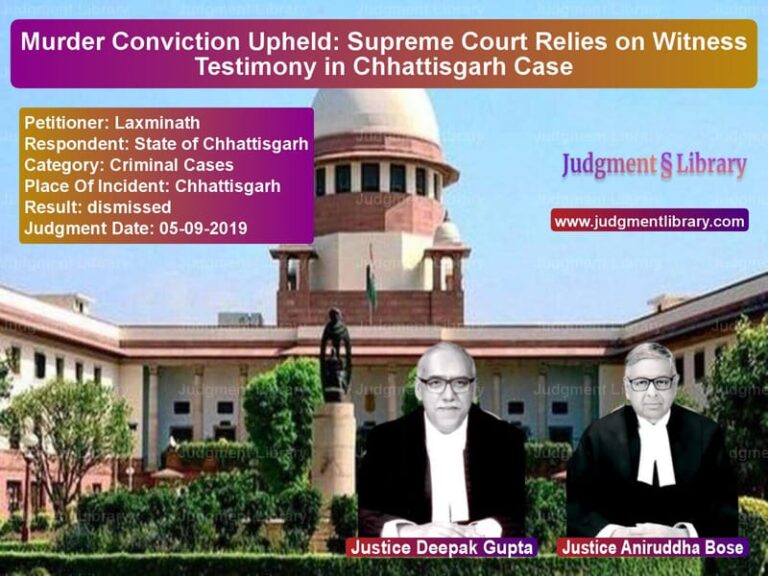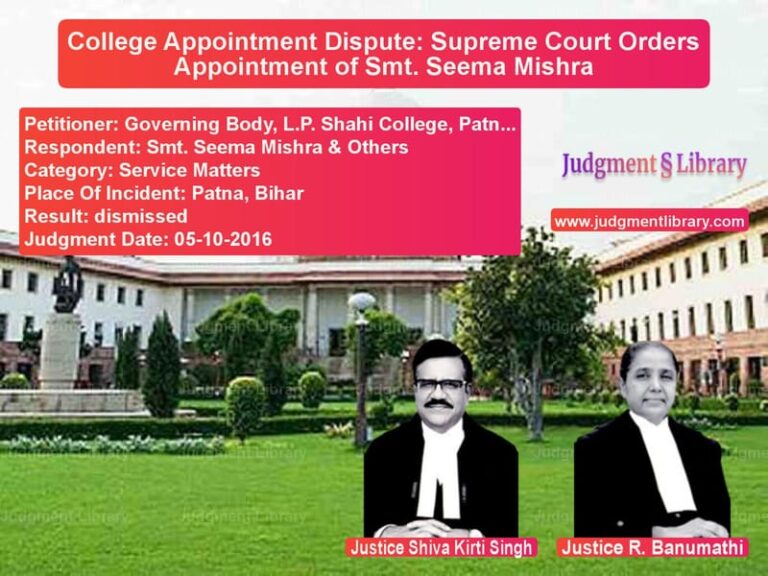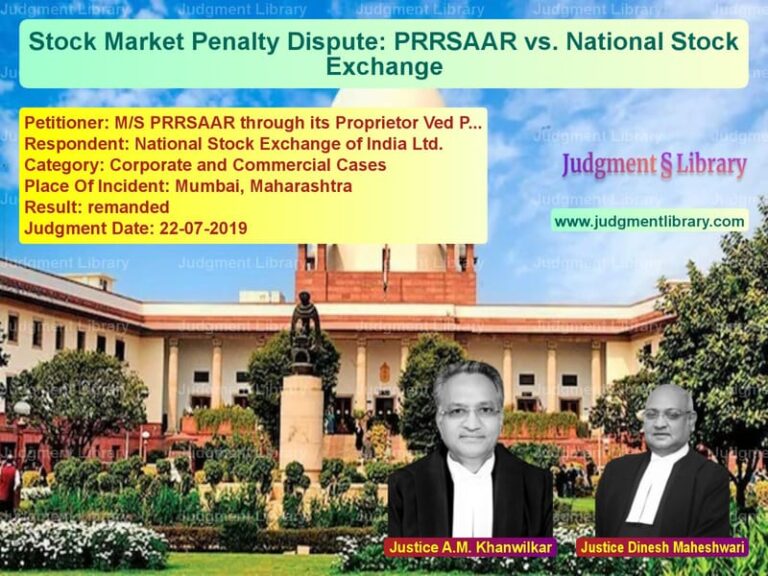Premium FSI Charges and Infrastructure Fees: Supreme Court’s Ruling on Chennai Metropolitan Development Authority
The case of Chennai Metropolitan Development Authority v. Prestige Estates Project Ltd. deals with the legality of revised charges for infrastructure and amenities (I & A) and premium Floor Space Index (FSI) in Chennai’s metropolitan development projects. The Supreme Court had to determine whether the Chennai Metropolitan Development Authority (CMDA) could levy additional charges after a developer had already paid fees based on prior rates.
Background of the Case
The respondent, Prestige Estates Project Ltd., submitted an application on 22 March 2011 for planning permission to construct a multi-storeyed complex in Ayyappan Thangal Village, Tamil Nadu. The CMDA forwarded the application for government approval, and on 5 January 2012, the State of Tamil Nadu granted conditional approval. The conditions required the developer to:
- Gift the land marked for road widening to CMDA before obtaining planning permission.
- Obtain a ‘No Objection Certificate’ (NOC) from Chennai Metropolitan Water Supply and Sewerage Board (CMWSSB).
After fulfilling the required conditions, the developer was asked to pay development charges. On 27 March 2012, CMDA issued a demand notice requiring the respondent to pay:
- Infrastructure and Amenities (I & A) Charges: Rs. 8,34,40,000
- Premium FSI Charges: Rs. 44,75,88,000
The developer paid the required amount on 28 March 2012. However, the Tamil Nadu government revised the guideline values and increased the I & A charges by 50% with effect from 1 April 2012. Based on this revision, CMDA issued a fresh demand on 22 August 2012, asking the developer to pay additional amounts:
- Balance I & A Charges: Rs. 4,17,15,000
- Balance Premium FSI Charges: Rs. 90,76,75,000
Aggrieved by the additional charges, the developer filed a writ petition before the Madras High Court, challenging CMDA’s revised demand.
High Court’s Decision
The High Court ruled in favor of the developer, stating:
- The developer had acquired a vested right to obtain planning permission once it had paid the original charges.
- The revised I & A charges could not be applied retrospectively.
- The CMDA’s demand for increased Premium FSI charges was arbitrary.
- CMDA’s demand was quashed, and the state was directed to adhere to the pre-revised charges.
Petitioner’s Arguments
CMDA and the State of Tamil Nadu contended:
- The law requires charges to be assessed based on rates prevailing at the time of granting planning permission, not the date of application.
- Merely submitting an application does not create a vested right in favor of the applicant.
- Government policies on I & A charges and Premium FSI charges can change, and developers must comply with the latest rates.
- The High Court erred in applying outdated charges when the revised charges were already in force.
Respondent’s Arguments
The developer, Prestige Estates, countered:
- The revised charges were notified after it had already paid the initial amounts.
- The principle of legitimate expectation should protect developers from sudden policy changes.
- Delays by government agencies should not penalize private developers.
- The demand for additional charges was arbitrary and imposed retrospectively.
Supreme Court’s Observations
The Supreme Court examined whether CMDA’s revised demand was justified under Tamil Nadu’s Town and Country Planning Act. The key findings were:
- The law requires I & A charges and Premium FSI charges to be based on rates prevailing at the time of granting permission.
- Paying earlier fees does not create an absolute right against revised charges.
- The revised charges, notified on 1 April 2012, were applicable to all approvals granted thereafter.
- The High Court erred in assuming that payment at earlier rates conferred a vested right on the developer.
The Court observed:
“No applicant has a vested right to have their application processed based on outdated charges. Government agencies have the authority to revise rates and apply them at the time of final approval.”
Final Judgment
The Supreme Court allowed CMDA’s appeal in part:
- The demand for revised I & A charges was set aside, as there was no legal amendment to the applicable rules.
- The demand for additional Premium FSI charges was upheld, as the new rates were in force when planning permission was granted.
- The developer must pay the revised Premium FSI charges before proceeding with the project.
Impact of the Judgment
This ruling clarifies key aspects of urban development policies:
- Revised rates apply at the time of granting planning permission, not at the time of application.
- Legitimate expectation does not override government regulations.
- Retrospective application of charges requires clear legal backing.
- State agencies must ensure clarity and consistency in levy of development charges.
Conclusion
The Supreme Court’s ruling ensures that government agencies have the authority to revise infrastructure and development charges but also protects developers from arbitrary retrospective charges. This judgment establishes a balance between regulatory authority and commercial stability, setting an important precedent for future urban development projects in India.
Petitioner Name: Chennai Metropolitan Development Authority.Respondent Name: Prestige Estates Project Ltd..Judgment By: Justice D.Y. Chandrachud, Justice Indira Banerjee.Place Of Incident: Chennai, Tamil Nadu.Judgment Date: 29-07-2019.
Don’t miss out on the full details! Download the complete judgment in PDF format below and gain valuable insights instantly!
Download Judgment: Chennai Metropolitan vs Prestige Estates Pro Supreme Court of India Judgment Dated 29-07-2019.pdf
Direct Downlaod Judgment: Direct downlaod this Judgment
See all petitions in Property Disputes
See all petitions in Contract Disputes
See all petitions in unfair trade practices
See all petitions in Judgment by Dhananjaya Y Chandrachud
See all petitions in Judgment by Indira Banerjee
See all petitions in partially allowed
See all petitions in Modified
See all petitions in supreme court of India judgments July 2019
See all petitions in 2019 judgments
See all posts in Civil Cases Category
See all allowed petitions in Civil Cases Category
See all Dismissed petitions in Civil Cases Category
See all partially allowed petitions in Civil Cases Category







